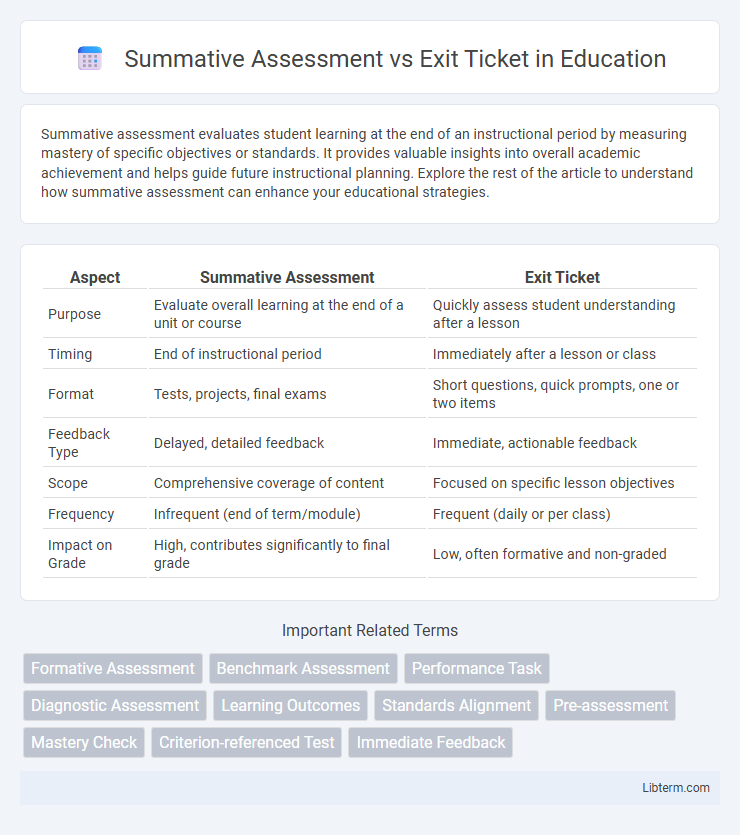Summative assessment evaluates student learning at the end of an instructional period by measuring mastery of specific objectives or standards. It provides valuable insights into overall academic achievement and helps guide future instructional planning. Explore the rest of the article to understand how summative assessment can enhance your educational strategies.
Table of Comparison
| Aspect | Summative Assessment | Exit Ticket |
|---|---|---|
| Purpose | Evaluate overall learning at the end of a unit or course | Quickly assess student understanding after a lesson |
| Timing | End of instructional period | Immediately after a lesson or class |
| Format | Tests, projects, final exams | Short questions, quick prompts, one or two items |
| Feedback Type | Delayed, detailed feedback | Immediate, actionable feedback |
| Scope | Comprehensive coverage of content | Focused on specific lesson objectives |
| Frequency | Infrequent (end of term/module) | Frequent (daily or per class) |
| Impact on Grade | High, contributes significantly to final grade | Low, often formative and non-graded |
Introduction to Summative Assessment and Exit Tickets
Summative assessment measures student learning at the end of an instructional period through comprehensive evaluations like final exams or projects, providing a summary of overall achievement. Exit tickets are brief, formative tools used at the conclusion of a lesson to quickly gauge student understanding and guide immediate instructional adjustments. Both methods serve distinct purposes in the assessment process, with summative assessments offering broader evaluation while exit tickets facilitate real-time feedback.
Defining Summative Assessments
Summative assessments are comprehensive evaluations conducted at the end of an instructional period to measure student learning against predefined standards and objectives. These assessments, such as final exams, standardized tests, and end-of-unit projects, provide a clear indication of overall academic achievement and mastery of content. Exit tickets, by contrast, are brief, formative tools used to gauge understanding immediately after a lesson, offering quick feedback rather than cumulative data.
What Are Exit Tickets?
Exit tickets are brief formative assessments used at the end of a lesson to gauge student understanding and inform immediate instructional adjustments. Unlike summative assessments, which evaluate overall learning at unit completion, exit tickets provide real-time feedback on specific concepts or skills. These quick, focused tools help teachers identify learning gaps and tailor subsequent lessons effectively.
Key Differences Between Summative Assessments and Exit Tickets
Summative assessments evaluate student learning at the end of an instructional period, providing comprehensive data on mastery of content, often through exams or final projects. Exit tickets offer quick, formative insights by capturing students' understanding immediately after a lesson, typically using brief questions or prompts. Key differences include their timing, purpose, and scope: summative assessments are summative and high-stakes, while exit tickets are formative, low-stakes tools for immediate feedback and instructional adjustment.
Purpose and Intent of Each Assessment Type
Summative assessments evaluate overall student learning and mastery of content at the end of an instructional unit, providing a comprehensive measure of achievement and informing final grades. Exit tickets serve as quick, formative tools to gauge student understanding immediately after a lesson, guiding teachers in adjusting instruction and identifying areas needing reinforcement. The primary intent of summative assessments is to assess cumulative knowledge, while exit tickets focus on real-time feedback for ongoing learning improvement.
Timing and Frequency of Use
Summative assessments are typically administered at the end of a learning unit or course to evaluate overall student mastery, occurring infrequently but with significant weight on final grades. Exit tickets are brief, formative checks given at the conclusion of a class session to gauge immediate understanding and inform instructional adjustments, used frequently and routinely. The timing of summative assessments aligns with curriculum milestones, while exit tickets provide real-time feedback to support ongoing learning progress.
Format and Structure Comparisons
Summative assessments typically feature structured formats such as multiple-choice exams, essays, or standardized tests designed to evaluate overall learning outcomes at the end of an instructional period. Exit tickets are brief, informal prompts or questions students answer at the conclusion of a lesson to quickly gauge comprehension and inform immediate instructional adjustments. The concise and flexible structure of exit tickets contrasts with the comprehensive and systematic format of summative assessments, reflecting their distinct purposes in measuring student understanding.
Impact on Student Learning and Instruction
Summative assessments provide comprehensive data on student learning, helping educators evaluate overall mastery and inform long-term instructional planning. Exit tickets offer immediate feedback on specific lesson objectives, enabling teachers to adjust instruction in real-time and address learning gaps promptly. Both tools impact student learning by guiding differentiated teaching strategies and promoting targeted academic growth.
Pros and Cons of Summative Assessments vs Exit Tickets
Summative assessments provide comprehensive evaluation of student learning with detailed feedback but can be time-consuming and induce high stress. Exit tickets offer quick, formative insights into student understanding, allowing for immediate instructional adjustments, yet they may lack depth and fail to capture overall mastery. Balancing summative assessments with exit tickets helps optimize both detailed evaluation and ongoing learning checks.
Choosing the Right Assessment for Your Classroom
Summative assessments provide comprehensive evaluation of student learning by measuring mastery at the end of an instructional unit, making them ideal for determining overall achievement and guiding curriculum adjustments. Exit tickets offer quick, formative feedback by capturing student understanding in real-time, perfect for informing immediate teaching decisions and addressing misconceptions. Selecting the right assessment depends on instructional goals, timing, and the depth of information needed to support student progress effectively.
Summative Assessment Infographic

 libterm.com
libterm.com